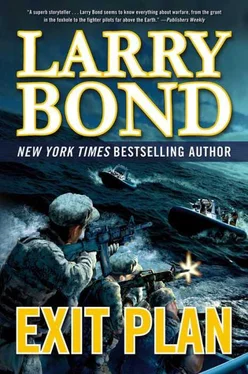“Another thing, General. They left Bandar Charak on Highway 96. We need to establish more roadblocks along that road. We don’t know which way they went, but they have been heading consistently southeast.”
“I’ve already ordered additional security checkpoints based on your previous report, Major. But I will reemphasize that all roadblocks need to have some sort of heavy weaponry to counter this threat.”
“Thank you, sir. That should suffice. I will keep you apprised of any further developments,” Rahim replied. The general’s forethought to establish more checkpoints encouraged Rahim. The pieces were in place, the general whereabouts of the enemy were now known, it was time to spring the trap.
“May Allah guide you, Hassan,” Moradi concluded.
“Thank you, sir. I have faith that He is doing so as we speak. Good-bye.”
6 April 2013
1930 Local Time/1530 Zulu
Kilo-Class Submarine, Yunes, SS903
Bandar Abbas Naval Base
Commander Ebrahim Mehr rubbed his eyes and stretched, pops and crunches came from his neck and shoulders. Only three more reports to go, then he could go home and sleep for the next two days. He hated paperwork with a passion, but it was a necessary evil. If he wanted to take his boat to sea, he had to ensure that all the forms and reports were done properly. His first officer had actually done most of the work, and done it well, but any captain worth his salt takes a personal interest in how well his ship performs, even when it comes to paperwork.
He grabbed the next report off the stack and looked at it. It was the boat’s maintenance and repair request. Shaking his head, he read the depressingly long list. Even though Yunes was the youngest of Iran’s three Kilo-class submarines, she was well past the point for her midlife overhaul. As with most things in life, equipment tends to break down more often with age. Still, his crew had done a fantastic job keeping the old girl running. They’d just completed a seven-day patrol in the Gulf of Oman, and it went off without a hitch. Mehr signed the request and hoped that half of the items would be approved.
A knock at his cabin door drew his attention away from the cluttered desk. A junior officer poked in his head and said, “Pardon the intrusion, Captain. But you are needed topside.”
Mehr closed his eyes and took a deep breath; he really didn’t need this distraction right now. “Lieutenant Kashani, you are the duty officer. I’m sure you can handle the situation.”
“Yes, sir. I tried,” Kashani complained. “But the man refuses to leave. He says he’s under direct orders to load the weapons he brought tonight.”
“What!? What weapons?”
“He just drove down onto the pier next to us with ten torpedoes and demanded that we help him load them.”
“But we just unloaded all our weapons this afternoon,” exclaimed Mehr, confused.
“Yes, sir. I told him that.”
“Surely they must be for Nuh.” Mehr gestured in the direction of their sister ship berthed behind them.
“No, sir. The transfer documents clearly list Yunes, hull 903, as the recipient. Here is the manifest.” Kashani handed the clipboard to his captain, who thumbed through it quickly. A sudden frown appeared on his face.
“These are all antisubmarine torpedoes,” Mehr remarked. “And this is over half again what we normally carry.”
Kashani nodded hesitantly. He was just as bewildered as his captain.
“And he wants to load them now? In the dark?”
“Yes, sir, he was very clear about that. Now you understand why you are needed topside.”
Mehr tossed the clipboard back to the lieutenant, and with one smooth motion he stood and snatched his ball cap from off its hook. “All right, Kashani, let’s go see what form of madness possesses this individual.”
The lieutenant moved out of the way as his captain headed aft toward the ladder well. Mehr leapt through the watertight door and then swiftly climbed the steps into the control room. The bridge access trunk was close by, and with little effort, Mehr scampered up the ladder to the bridge. After threading his way around some masts, he emerged from a hatch on the starboard side of the sail. Walking around the sail, Mehr returned the salute of his quarterdeck watch and strode down the brow.
On the pier was a truck and five weapons dollies, each one bearing two torpedoes. An impatient-looking lieutenant commander was pacing in front of the truck. Before Mehr could address the officer, a voice greeted him from behind.
“Good evening, Captain.”
Mehr turned and saw his squadron commander, Captain Aghassi, approaching him. He snapped to attention and rendered the proper honors. “Good evening, sir.”
“I’m sorry to spring this on you without warning, Ebrahim. I need your crew to begin loading these torpedoes immediately. In the meantime, you will come with me,” Aghassi ordered.
Surprised, Mehr hesitated for only a few seconds. “Yes, sir. I’ll get my men started at once.” Pivoting smartly, he faced his duty officer and issued a string of commands. “Lieutenant Kashani, find the first officer and inform him I’ve been called to an unexpected meeting with the squadron commander. He is to begin loading these torpedoes immediately. Have him ensure extra safety precautions are taken, as we will be loading in the dark. I don’t want anyone to get hurt. Also, have him begin preparations for getting underway. Understood?”
“Yes, Captain!” exclaimed the young officer. Filled with excitement, he turned around and ran back up the gangplank.
Aghassi smiled as they walked toward the squadron building. “You’re very perceptive to assume that you’ll be ordered to sea soon, Ebrahim.”
Mehr chuckled. “With respect, sir. A blind man could see that one coming. Why else would you have me load weapons in the dark, unless I was to put to sea early in the morning. I am confused though about the loadout. Why only antisubmarine torpedoes?”
The expression on the squadron commander’s face changed abruptly. His tone as he spoke was stern. “Captain, the mission briefing you are about to attend will be politically charged, but also vital, I repeat, absolutely vital , to the security of the Islamic Republic. Do not say the mission cannot be done. Do not say there is little chance of success. In fact, my advice to you is to say as little as possible.”
The submarine captain stopped suddenly and faced his superior, a feeling of dread welling up within him. “Are you saying I can’t give my professional opinion or ask questions about this upcoming mission, sir?” Mehr asked pointedly.
Aghassi shook his head. “No, Ebrahim. You are my best submarine commanding officer, and your words will have considerable weight. I’m merely suggesting that you use as few as possible. You can say the mission will be a challenge. You can even say it will be difficult, but you cannot say it is nearly impossible.”
“Even if I believe it is?” asked Mehr, seeking clarification.
“Even if you believe it is,” replied Aghassi.
The two men finished their walk to the squadron headquarters building in silence. A guard opened the door and saluted as they entered. Aghassi led the way down the corridor to the conference room, the sounds of a heated debate spilling out into the hallway. Mehr’s feeling of apprehension grew with each step. Just what sort of mess was he getting into?
As they passed through the doorway, Mehr saw two admirals, one Pasdaran, one Artesh, or regular navy, seated at the conference table along with a few staff officers. The Pasdaran and Artesh were two separate armed forces serving the same nation. They competed for scarce funds and political power. And each service thought the other was an ineffective joke. Politically charged indeed , thought Mehr. The two admirals sat at opposite ends of the long table.
Читать дальше












